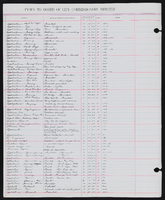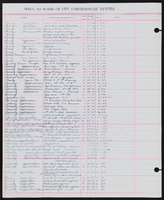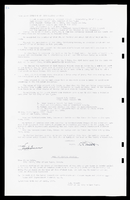Search the Special Collections and Archives Portal
Search Results

Transcript of interview with Aaron Rosenthal by David G. Schwartz, December 21, 2016
Date
2016-12-21
Archival Collection
Description
Aaron Rosenthal grew up in Las Vegas and graduated from the University of Nevada, Las Vegas with a degree in finance. He started in the gaming industry at The Mirage in 1997 by going through the Management Associate Program and working as a slot operations analyst. He then moved to the Beau Rivage in 2000 into the role of database marketing manager and eventually into the position of director of slot marketing. In 2002, he became director of loyalty programs on the corporate side of MGM Mirage before going to Treasure Island as vice president of slot operations and marketing in 2003 and eventually back to The Mirage into that same role in 2005. Rosenthal eventually joined Penn National Gaming where he held the positions of vice president of marketing at Hollywood Casino at Charles Town Races in 2009 and assistant general manager of Hollywood Casino at Kansas Speedway in 2011. He returned to Las Vegas to become vice president and general manager of Cannery Casino Resorts in 2013 and traveled to Missouri to hold that same position at the Argosy Casino & Hotel in 2014. Rosenthal is currently the vice president and general manager of Tropicana Las Vegas. The interview with Rosenthal begins with his discussion of his start in the slot industry and the various slot operations and marketing roles he held with MGM Mirage/MGM Resorts. This discussion also involves his experiences in dealing with slot vendors and his philosophy on laying out a slot floor. Rosenthal also describes his experiences and duties as assistant general manager and general manager at various properties. He provides his opinion on what makes both good and bad slot managers, his perspective on what he believes customers are looking for in playing slots, how slot management has changed over time, and what the future of slots will hold. The interview concludes with Rosenthal’s discussion on his personal gambling preferences as well as his advice to young people who want to go into the slot industry.
Text

Transcript of interview with Laura Taylor by Claytee D. White, December 3 & 8, 2008
Date
2008-12-03
2008-12-08
Archival Collection
Description
Laura Taylor was born in New Haven, Connecticut and spent her childhood bouncing between New York and Ohio to follow her father’s career. Robert Cox, her father, was a businessman who attended Syracuse University on the GI Bill. Her mother, Lillian Cox (neé Bower) was concert pianist and college music professor. At the age of seventeen, Taylor received a scholarship to attend the Cincinnati Conservatory of Music in Cincinnati, Ohio under the tutelage of Dr. Robert Powell. Unfortunately, Dr. Powell died two years later, which prompted a move into commercial music. Taylor performed at a number of local clubs as well as soloed in national commercial campaigns for United Airlines and Buick. She moved to Miami, Florida with her first husband in her early 20s. After she and her husband divorced, Taylor recorded her first album with Good Sounds Records of Criteria Studios. Her songs Dancin’ in My Feet, Lady Scorpion, All Through Me, and Some Love made Billboard and Record World charts. She returned to New York City and formed the Laura Taylor Trio to perform jazz music in famous hotels like the Plaza Hotel and The Waldorf Astoria Hotel. Taylor moved to Las Vegas, Nevada in 1983 to open for Don Rickles at the Desert Inn Hotel, which led to many years of performing in the Desert Inn’s Starlight Theater. She married her second and current husband, Robert Cox, in 1985 after meeting him at a concert. Taylor also enjoyed a number of jazz performances on public radio and at a number of venues across Las Vegas. Today, Laura Taylor is still active in the jazz world of Las Vegas, serving as a member of the Las Vegas Philharmonic and the Jazz Society. She also continues to write and perform jazz music, appearing at Smith Center for Performing Arts as well as releasing five CDs.
Text
Audio recording clip of interview with Benjamin C. Diven by Mary Palevsky, March 10, 2004
Date
2004-03-10
Archival Collection
Description
Narrator affiliation: Physicist, Los Alamos National Laboratory; Manhattan Project
Sound
Audio recording clip of interview with George and Theresa Maynard by Mary Palevsky, January 26, 2004
Date
2004-01-26
Archival Collection
Description
Narrator affiliation: Atomic Veteran, Armed Forces Special Weapons Project
Sound
Audio recording clip of interview with George and Theresa Maynard by Suzanne Becker, February 16, 2005
Date
2005-02-16
Archival Collection
Description
Narrator affiliation: Atomic Veteran, Armed Forces Special Weapons Project
Sound

Transcript of interview with Kevin Brady by David G. Schwartz, September 7, 2016
Date
2016-09-07
Archival Collection
Description
Kevin Brady was born in Chicago, Illinois and grew up in Pennsylvania. Brady started in the gaming industry in 1993 as a surveillance officer for Players International Lake Charles and eventually became a surveillance supervisor at Paragon Casino Resort. He later became a surveillance manager and casino controller at Harrah’s St. Louis where he worked in finance while also earning his master’s degree in business administration. Brady later entered the position of eastern division director of slot operations for Harrah’s in 2001 before transferring to Harrah’s Shreveport to work in slot operations. He worked there during Boyd’s purchase of the property and then went to Delta Downs to manage several areas of that location. Brady became vice president of slot operations at Mohegan Sun in 2005 and after two years moved to the Sands Casino in Pennsylvania where he worked for another seven years. Brady currently works at Resorts Mohegan Sun in Atlantic City as vice president of casino operations. The interview with Brady begins with his narrative of his journey through his various positions and roles in the gaming industry. During the discussion, he also talks about his experience and approach in negotiating with vendors for new slot games on the floor, and he provides his philosophy on how to lay out a slot floor. Brady then discusses his view on what makes a good slot manager, with a focus on how to lead employees, and he then talks about the changes in technology since he first started in the slot industry. He also describes how the gaming business has changed overall since he first started, and he gives his opinion on what he believes the future of slots will hold, specifically regarding skill-based gaming and millennials. The interview concludes with Brady describing his personal gambling and his own advice to young people who might want to go into slot operations.
Text
Pagination
Refine my results
Content Type
Creator or Contributor
Subject
Archival Collection
Digital Project
Resource Type
Year
Material Type
Place
Language
Records Classification




